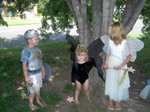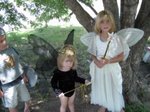WRITING CHEROKEE
A legacy worth preserving
The early 1800s brought a new era to the Cherokee Indians. As well as bringing Christianity, missionaries moving into Cherokee country brought exposure to education in writing and other academic disciplines. As a result, Sequoyah, a Cherokee tradesman, became inspired by the white man's ability to use written communication.
According to James Wafford. his second cousin, Sequoyah was born about 1760, west of Chillowee Mountain and just east of Tasgigi in Monroe County, Tennessee. His mother, Wurreh, was of the Red Paint clan. His father's identity is still in dispute.
In 1809, while watching some traders using written records. Sequoyah had an idea. If the white people could make marks on "leaves."(paper) and then later the same marks could "talk" back, why couldn't the Cherokee do the same thing? For twelve long years Sequoyah experimented; creating, and discarding Cherokee symbols until he hit upon the idea of utilizing the syllables. Though he had been ridiculed and called "crazy" by other Cherokees, he never gave up on his dream. By 1821, he had isolated eighty-six syllables (later discarding one) to arrive at the eighty-five syllabary used by Cherokees today.
One indication of the genius of Sequoyah is that the Cherokee syllabary is the only working alphabet is history to be developed by a single person. This is even more amazing in light of the fact that Sequoyah never learned to read, write or even speak English. When Sequoyah proved to the tribal elders how he could teach other Cherokees to communicate using written words, he was highly honored for his great accomplishment. In fact, within the year, his syllabary and writing method were adopted as the official written language of the Cherokee Nation. A reference from James Mooney's Myths of the Cherokee and their- Sacred Legends further attests to Sequoyah's genius. "No schools were built and no teachers hired, but the whole Nation became academy for the study of the system, and in the coarse of a few months, the Cherokee people were reading and writing in their own language."
The Cherokee have always been the mountaineers of the South, the hill people who at one time held over 40.000 square miles of land in what is now North and South Carolina, Virginia, Tennessee, Georgia and Alabama. Today, tile Eastern Band, as they are now known, live on the Qualla Boundary Cherokee Indian Reservation. These are the descendants of the 300 Cherokees who, under the leadership of Chief Tsali, hid in the Great Smoky Mountains until they were allowed to stay. In retaliation for the resistance, the United States Army executed Chief Tsali.
The Cherokee language and culture is what makes the Cherokee different from the Creeks, the Osage, the Mexican, or any other linguistic group. Speaking the language says "We're proud to be Cherokee." It is a source of pride, self-esteem and honor. When you learn the language of your heritage, it becomes a realization of a courageous and proud heritage.














3 comments:
Great post... As you know, my great-grandmother on my dad's side was Cherokee... (I have a funny sort of nose, and they tell me it looks just like hers.. lol) Dad also tells me she was the meanest woman on the planet... lol
Isn't that amazing, one man responsible for creating the whole written Cherokee language. Both my grandparents were born in Cherokee, North Carolina. I'm looking for Cherokee relatives in my family tree currently.
I wonder if they teach about Sequoyah in the history of the United States? Because what he did WAS quite amazing.
Post a Comment